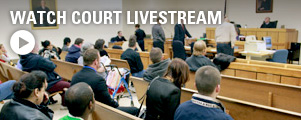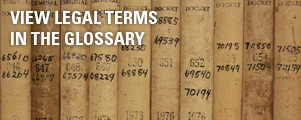Twelve not-too-angry men (and women)
We convened the first meeting of the group of people who told us at the all-court meeting that they wanted to have a voice in our project. Twelve of us sat together in a small courtroom upstairs at the court, including First Justice Mark Coven, Clerk Magistrate John Dalton, Assistant District Attorney Jason Mohan, members of the Norfolk County Bar Association including public defenders and private lawyers, and a representative of DOVE, the domestic violence advocacy group, as well as John Davidow, Joe Spurr and I.
As journalists, we’re used to being the listeners who hear all sides of a story, but we’re in a slightly different position here – with the blessing of the Massachusetts Supreme Judicial Court to fully open the court, we (along with the judge whose courthouse we’ll be in) have to make decisions about how to run the project. To inform our decisions, we want to hear from the people whose lives and whose clients’ lives will be most affected.
Several people were concerned about who would be allowed onto the wireless network, and whether there would be passwords and a registration process. Our bar will be pretty low. We plan on having a registration process where people will have to enter their names, email addresses, and their journalistic or blog affiliation when they sign on to the network. We won’t strictly police who is on it – if problems arise after the network goes up, we’ll address them then.
Then the conversation turned to how we are going to alert people coming into the courtroom that the proceedings are being streamed live on the internet. It was easily resolved — we’ll put the word out in local and lawyerly publications, put a big sign on the door and by the DA’s table, and the presiding clerk will make an announcement at the beginning of the day.
This segued into the conversation about if and how we’re going let people know they’re in the frame of the video. We floated ideas to have a video monitor where everyone could see it, or taping a line on the floor delimiting the camera’s frame. But Judge Coven put his foot down. He didn’t want the monitor to distract from the proceedings and he didn’t want people dancing around the line on the floor — he thought that both took away from the ceremony and the dignity of the courtroom. Judge Coven occasionally quashes objections with a curt declaration that the courtroom is public, and the public has a right to see and know and hear what’s going on.
But there are exceptions to complete openness, which brings us to our next topic, in what cases can the camera be shut off?
For the most part, the camera will be running throughout our scheduled day but we began to talk about the checklist we want to put together of reasons why the judge can turn the camera off. What should be on the list? How will it be integrated into the workflow of the court? What kind of technology will be used to implement it?
This is one of the most difficult questions to answer. We will be looking at legal reasons not to broadcast cases as well as cases of a sensitive nature. Judge Coven has said that he wants to be careful about showing certain types of cases – such as those involving domestic violence victims – that might scare women (or men) off from coming to the court to seek redress.
Clerk Magistrate John Dalton expressed concern about potential censorship, positing that anything shown in open court should be broadcast — even sensitive issues like 209a’s (restraining orders). Judge Coven reiterated there was a presumption of openness, and that from there we should be working through the exceptions.
The Harvard Cyberlaw Clinic is putting together a preliminary checklist for us and we decided that hammering out specifics and protocol should be a topic for our next meeting. We’ll circulate the preliminary checklist and work from there.
Defense attorney Richard Sweeney affirmed he was only looking for the legal reasons to shut down the feed, not just finding arbitrary reasons. Making a checklist in advance would help the judges and the lawyers know where the boundaries are. He said that if given input on the rules regarding this issue, the defense lawyers would abide by the rules that we collectively set.
As for how to integrate it, Rick suggested we adopt a protocol they use in Probate Court, wherein they use different colored paper so a judge or a clerk can find a financial form or a list of child support guidelines quickly in a thick file. He suggested perhaps we’d use a red sheet for a sensitive case, which would be a flag to the judge and clerk before any defendants are even called up.
The technology is a much bigger discussion, for another day.
We also talked about how to avoid getting certain types of conversations caught on the audio feed, a concern of both the defense attorneys (confidential attorney-client conversations) and the DA (to avoid revealing that a defendant has been, for lack of a better word, snitching).
This may involve a combination of mute buttons and good old fashioned awareness-raising. People may just have to step away from the mikes if they want to say something confidential or say it between sessions when we’re not broadcasting, and we may have to come up with a sidebar mute button that affects the broadcast, but not the official record. There are red mute buttons on the microphones, but no one ever hits them.
It’s at moments like this that our project begins to seem endlessly complicated and the traps multifarious and unending. We are treading as carefully as we can.
Then we came to the most controversial topic: will we be archiving the feed? Most people were opposed to it at first. Public defender Julieann Hernon was the most strenuously opposed – she felt like people would become “unwilling conscripts into a reality TV show.”
Then Donna Morelli of DOVE said she realized that this technology was an inevitability and the idea should be to do it as responsibly as possible. In 10 years, she said, people might not even go to court. Court might happen over Skype, who knows?
That’s the point that we at WBUR had come to in our discussions before the meeting – that this is inevitable. That our definitions of public and private are changing. That our lives will be digitized and made accessible to whomever wants to see it. And that these new policies will have real repercussions on real people’s lives. So how do we do it responsibly?
Rick began to push that we should be archiving the footage. He brought up instances where their law firm and the D.A’s office legally froze pages from Facebook or other social networking sites because they were central to homicide cases. He said he would prefer that WBUR would archive rather than an outside entity. He was sure that if we didn’t do it, someone else would take it as a business opportunity and if so, lawyers would have no access to it. And no legal recourse to take down anything injurious, or any way to view the original footage.
Slowly, most people came around to a pro-archiving point of view.
Judge Coven could see both sides of the problem. On one, there’s the embarrassment factor, the public humiliation, which he didn’t want to foster. But on the other hand, the Quincy Patriot-Ledger runs the police blotter everyday, and this isn’t much different.
This remains an open question, the largest one by far.
The last issue of the day was our policy on blog commenting. Many present were worried about the toxic and unproductive comments that you find on, for example, many court-related stories on the Quincy Patriot-Ledger. While our instinct is to create an open space for dialogue and part of the grant is to foster a community of people who are talking about court transparency, we want to create digital decorum similar to what you find in the courtroom – where you’ll be ejected or at least told to clam it if you’re talking too loudly. So for starters, we won’t have comments underneath the blog posts about the live feeds, but we will have comments open on the blog posts that we write about the process of bringing the court online.
Our next meeting was postponed by the (what else?) snow. When it clears, we’ll meet again.











